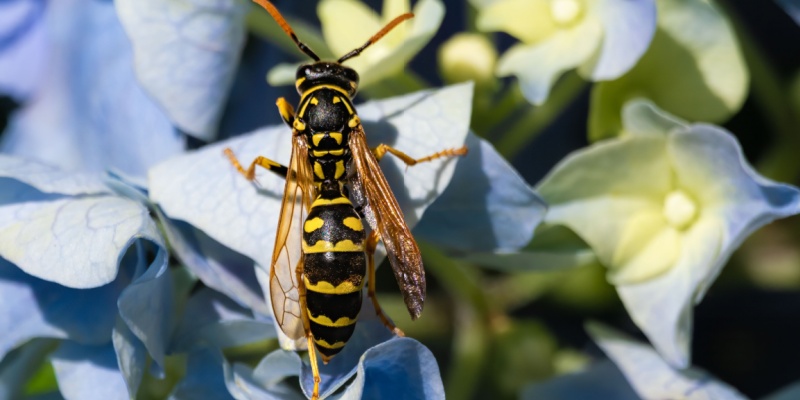As Indianapolis residents prepare for outdoor activities each spring and summer, stinging insects like wasps, hornets, and yellowjackets often become unwelcome guests. While these insects play beneficial roles in our ecosystem as predators of pest insects and pollinators, their painful stings and potential for causing allergic reactions make them concerning neighbors. Fortunately, a proactive approach can significantly reduce your risk of stinging insect problems.
Understanding the Threat
Indianapolis properties typically encounter several types of stinging insects:
Paper Wasps
- Build open, umbrella-shaped nests with visible cells
- Commonly nest under eaves, deck railings, and porch ceilings
- Moderately aggressive when nest is disturbed
- Beneficial predators of caterpillars and other garden pests
Yellowjackets
- Construct enclosed paper nests in ground, wall voids, or hanging from structures
- Highly aggressive, especially in late summer
- Attracted to human foods, particularly sweets and proteins
- Cause most stinging incidents in Indianapolis
Bald-Faced Hornets
- Create large, football-shaped paper nests typically in trees or shrubs
- Very defensive of their nests
- Less interested in human food than yellowjackets
- Beneficial predators of flies and other insects
Carpenter Bees
- Drill perfectly round holes in wood to create nesting galleries
- Males cannot sting; females rarely sting unless handled
- Can cause structural damage over time
- Provide important pollination services
Honeybees
- Managed colonies usually in hives; occasionally establish wild colonies
- Generally non-aggressive unless hive is threatened
- Essential pollinators that should be preserved when possible
- Swarms are temporary and typically move on within 24-48 hours
Preventive Strategies for Your Home
Structural Prevention
Modify your home to make it less appealing for stinging insects:
- Seal entry points: Caulk cracks and gaps in siding, around windows, doors, pipes, and utility penetrations
- Screen vents and openings: Install fine mesh screens over attic vents, chimney openings, and other necessary openings
- Cap hollow structures: Close off openings in fence posts, playground equipment, and deck railings
- Repair damage: Replace rotted wood, broken siding, or damaged trim that could provide nesting spaces
- Maintain screens: Ensure window and door screens are intact to prevent indoor entry
Landscape Management
Your yard's features significantly impact stinging insect presence:
- Create buffer zones: Keep flowering plants away from high-traffic areas like patios and play spaces
- Remove brush piles: Eliminate piles of vegetation that can harbor ground-nesting species
- Fill ground holes: Address abandoned rodent burrows and other soil cavities that yellowjackets favor
- Trim vegetation: Keep bushes and tree limbs trimmed away from your home's exterior
- Maintain mulch: Keep mulch layers under 2 inches to discourage nesting
Food and Water Management
Minimize attractants around your property:
- Secure trash containers: Use cans with tight-fitting lids and clean them regularly
- Clean outdoor dining areas: Promptly clean food residue and spills from tables and grills
- Cover food: Keep outdoor food covered until ready to serve and promptly put away after meals
- Manage pet food: Don't leave pet food outdoors, especially for extended periods
- Reduce standing water: Eliminate unnecessary water sources that attract insects seeking moisture
Early Detection
Finding nests while they're small makes management much easier:
- Regular inspections: Check your property biweekly during spring and summer
- Focus on key areas: Pay special attention to eaves, overhangs, decks, and sheltered spots
- Look for flight patterns: Watch for insects repeatedly flying to and from a specific location
- Check vegetation: Inspect bushes and trees for the papery nests of hornets and yellowjackets
- Monitor ground activity: Watch for insects entering and exiting ground holes
Professional Prevention Programs
For comprehensive protection, professional services offer significant advantages:
Preventive Treatments
Professional-grade preventive applications create barriers against nest establishment:
- Targeted application to common nesting areas in early spring
- Long-lasting residual products that continue working for weeks or months
- Professionally applied products that reach areas DIY approaches might miss
- Safe application methods that protect family, pets, and beneficial insects
Regular Monitoring
Professional services include ongoing vigilance:
- Scheduled inspections throughout the stinging insect season
- Early detection of nesting activity before colonies become large
- Problem area identification unique to your property
- Adjustment of strategy based on changing conditions
Customized Approach
A quality provider develops a plan specific to your property:
- Property assessment to identify risk factors
- Species-specific strategies based on local insect populations
- Integration with existing landscaping to minimize disruption
- Consideration of family needs including allergies or sensitivities
Trio Pest Control's Comprehensive Approach
At Trio Pest Control, we provide complete stinging insect protection for Indianapolis properties:
- Thorough property evaluation to identify existing and potential nesting sites
- Preventive treatments that discourage nest establishment
- Safe removal of existing nests using appropriate techniques
- Ongoing monitoring to prevent colony development
- Customized recommendations for long-term protection
Don't wait until stinging insects have established problematic colonies around your Indianapolis home. Contact Trio Pest Control today for proactive protection that keeps your family safe while enjoying the outdoors.
